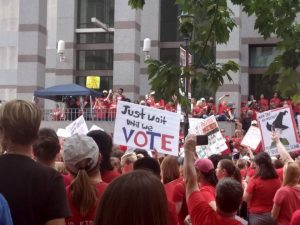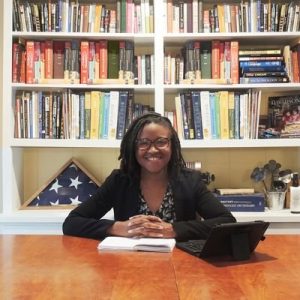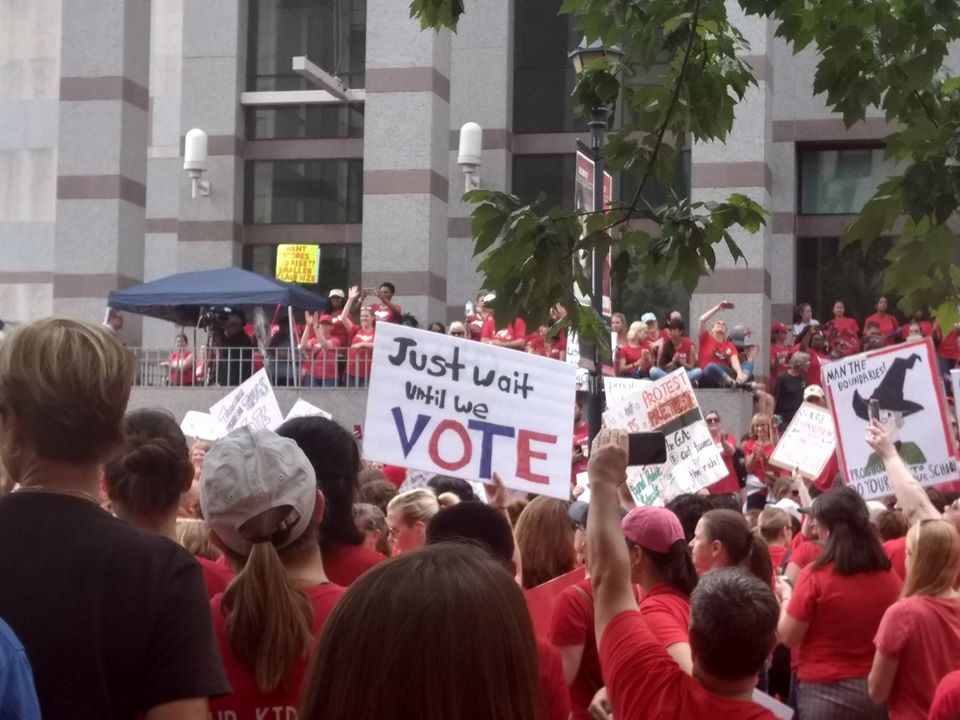 It’s the beginning of 2020 and we’re talking about how to keep resolutions, form better habits, or how much of the impeachment hearings we can stand to follow. I’m thinking about who we are as a country. I am beginning to understand that, in America, the have-nots’ demands for their inalienable rights of life, liberty and the pursuit of happiness is a zero-sum game. If we (Blacks or people of color, women, those with disabilities or in the LGBTQIA community) finally start to get equal footing in this country, those who have always wielded power and control lose. Personally, I agree with Jesse Williams, “Equal rights for others does not mean fewer rights for you. It’s not pie.”
It’s the beginning of 2020 and we’re talking about how to keep resolutions, form better habits, or how much of the impeachment hearings we can stand to follow. I’m thinking about who we are as a country. I am beginning to understand that, in America, the have-nots’ demands for their inalienable rights of life, liberty and the pursuit of happiness is a zero-sum game. If we (Blacks or people of color, women, those with disabilities or in the LGBTQIA community) finally start to get equal footing in this country, those who have always wielded power and control lose. Personally, I agree with Jesse Williams, “Equal rights for others does not mean fewer rights for you. It’s not pie.”
I have a complicated love for America. I believe in our country’s capacity to uplift people and help them achieve their dreams. I believe in the power of the vote in holding your elected officials accountable for everything from accessibility in downtown spaces to fighting for comprehensive and affordable healthcare. I believe that the highest form of patriotism is to speak up and defend our right to live a full, healthy and safe life while recognizing that everyone hasn’t had the possibility of the white picket fence version of the American Dream. Why should we boast that America is the richest and most powerful country in the world if that claim doesn’t represent all of our citizens and residents?
Wealth, known as items of value that we can pass on in our family, is a privilege that Black Americans have been locked out of in America. The Pew Research Center reports that the median Black household has only 10 cents of wealth for every dollar in White households. The cumulative chasm continues to widen between Black and White middle-class families as a result of decades of systemic, unjust practices that have resulted in segregated schools and communities. Schools with a high number of students living in poverty tend to be labeled as “failing” and almost always lack rigorous college prep opportunities such as offering AP or IB courses. We need a national conversation that finally addresses the educational inequity in not providing the necessary resources for all students to succeed.
In short, we need to do more, as a country, to improve social mobility to the marginalized and disenfranchised who live in the cycle of concentrated and generational poverty that our country has left on their own.
But what do we do? How do we not let despair wash over us at all that needs to be done? I am buoyed by Bryan Stevenson’s optimism when he says, “Hope is your superpower. Don’t let anybody or anything make you hopeless. Hope is the enemy of injustice. Hope is what will get you to stand up when people tell you to sit down.”
I believe in the power of hope and the urgency of political action. We all can do more for others and for our community because it’s the right thing to do. In 2020, we must vote for candidates that have a plan to address the injustices in our country related to education, wealth and income inequality and lack of affordable housing or healthcare. We have to remind everyone we know to use their power at the ballot box to change the political systems at every level, not just the Presidency. North Carolina’s ballot will include races such as the U.S. Senate, Governor and Lieut. Governor, the State Superintendent of Schools and the Commissioner of Agriculture. (The environmental justice movement is real, y’all.).
In 2018, we saw a historic and inspiring number of women run and win seats in Congress. I was in a political run myself that year for an open seat in the state Senate. I ran to expand Medicaid for over half a million uninsured North Carolinians and to provide more funding and resources in our schools. On the day several districts across the state were closed for the March for Students and Rally for Respect, I proudly walked in the red sea of educators and supporters to the Capitol in Raleigh. Being there to see and hear the call that we must do better for our children was one of the most monumental days of my life. Despite the rhetoric from those who didn’t approve, claiming that the teachers’ absence from school was harming students, this was the American way to me: embodying advocacy by calling out the systemic wrongdoing and offering practical solutions. That’s why I ran for office, sacrificed long stretches of time away from my family and pushed myself to talk to anyone who would listen (highly uncharacteristic of me) about how we could do more for our communities. I ended up losing that race, and two others that I ran for in local elections, but I don’t regret trying. The effort was time-consuming, hard, scary and, sometimes, lonely. I fear that some didn’t care about my message once they saw the “D” by my name. But if you care about making a difference, running for office is worth a shot, no matter the outcome.
The current system has not worked to support all Americans. Having a chance at a full and happy life should not be limited by your proximity to wealth, power and privilege. If the system doesn’t work for all of us, together, we have the power to tear down these crushing walls and raise up new opportunities. The American Dream belongs to all of us even if we have to wrench that apple pie out of the hands of our oppressors.

Cheraton Love, a biology instructor and administrator in higher education, loves reading especially about history and politics. She lives in Thomasville with her husband and three daughters.

There are no comments
Add yours